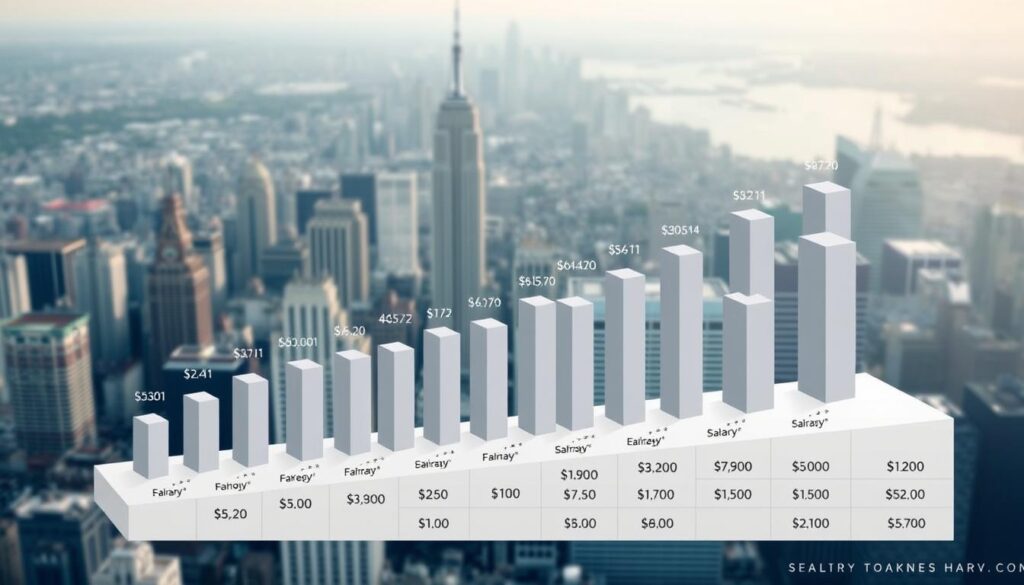Affiliate Disclosure
HVAC Guide Guys is a participant in the Amazon Services LLC Associates Program, an affiliate advertising program designed to provide a means for sites to earn advertising fees by advertising and linking to Amazon.
How Much Do HVAC Pay? Are you curious about the financial side of an HVAC career? This field offers stable income, growth chances, and is in high demand across the U.S. Knowing how much HVAC technicians earn is key for those thinking about this career.

The HVAC technician salary scene is full of promise. From starting jobs to top roles, workers can earn good money based on their skills, experience, and area of focus. Data shows great earning chances for those eager to join this vital industry.
This detailed guide will cover all you need to know about HVAC pay. We’ll look at how pay changes with experience, location, and special skills. Whether you’re a student looking at careers or a pro aiming to move up, you’ll find useful info on HVAC’s financial benefits.
Key Takeaways
- HVAC technicians enjoy competitive salaries with significant growth opportunities
- Entry-level and senior positions offer distinct compensation ranges
- Certifications and specialized skills can boost earning
- Geographic location plays a big role in HVAC technician salaries
- The HVAC industry offers stable career opportunities with promising financial prospects
How Much Do HVAC Pay: National Salary Overview
Understanding hvac installer wages is key to your HVAC career. Salaries change based on experience, location, and specialization.
The HVAC industry offers good pay at different career levels. Your earnings depend on several important factors. These factors affect hvac service rates and your total income.
Entry-Level HVAC Salaries
Starting in HVAC, you can expect an average salary of $54,100 a year. Your first-year pay depends on:
- Where you live
- Local demand
- Your technical skills
- Initial training and certifications
Mid-Career HVAC Earnings
With more experience, your pay will go up. Technicians with 2-4 years of experience make about $65,700 a year.
Mid-career earnings are influenced by:
- Advanced technical certifications
- Specialized skills
- Your work performance
- The company you work for
Senior-Level HVAC Compensation
Experienced HVAC technicians with 4-7 years earn $77,200 or more. At this level, you can:
- Take on management roles
- Work in specialized technical areas
- Get paid more for commercial projects
- Explore consulting opportunities
Your earning power grows as you gain expertise and build a strong reputation in HVAC.
Explore Our HVAC Shop
Looking for top-rated HVAC tools, parts, and accessories? Visit our shop and find the perfect solution for your needs.
Visit the ShopTop-Paying States for HVAC Technicians
Thinking about a career in HVAC? Knowing where you can earn the most is key. Some states pay HVAC technicians much more, making where you work very important.
California is at the top with its high salaries. The state’s need for HVAC services and its complex weather drive up the pay. HVAC technicians in California earn well, thanks to the state’s strong economy.
- California: Highest average salary at $59,200
- New Jersey: Strong second with $58,300 annual earnings
- Washington: Competitive $58,000 annual compensation
How much you earn as an HVAC technician changes a lot depending on where you are. Cities in these states often pay even more because of the demand and the work needed.
Things like the economy, how many people live there, and the local setup affect how much HVAC techs make. Places with extreme weather or fast-growing cities usually offer better pay for skilled workers.
Pro tip: Research local market conditions before making a career relocation decision.
Don’t just look at the base salary. Think about other things like:
- Cost of living adjustments
- Overtime opportunities
- Benefits packages
- Career advancement possibilities
Choosing where to work can really change how much you make in the HVAC field over time.
Explore Our HVAC Shop
Looking for top-rated HVAC tools, parts, and accessories? Visit our shop and find the perfect solution for your needs.
Visit the ShopExperience Levels and Salary Progression
Your HVAC career is a journey of growth and higher earnings. As you move from apprentice to expert, your skills and pay will grow. Knowing how your salary will increase helps you plan your career in HVAC.
Apprenticeship to Expert Journey
At first, your HVAC career starts with an apprenticeship. You’ll earn about 30-50% of what a fully licensed tech makes. Apprentices usually earn $15 to $20 an hour, based on where you work and the contractor’s pricing.
- First year: Learning basic skills
- Second year: More hands-on experience
- Third year: More independent tasks
- Fourth year: Almost at journeyman level
Skills Development Impact on Earnings
Getting better at specific skills can really boost your income. Those who keep learning see big pay increases.
| Skill Level | Potential Salary Increase |
|---|---|
| Basic Technical Skills | 0-10% |
| Advanced Technical Certifications | 15-25% |
| Specialized Technology Expertise | 25-40% |
Management Position Compensation
Getting into management is a big step in your HVAC career. Leaders in HVAC often get paid more. Technical managers and senior supervisors can make $70,000 to $120,000 a year, based on the company and location.
- Team Supervisor: Higher base salary
- Operations Manager: Complete compensation package
- Technical Director: High executive earnings
Geographic Salary Variations in Major Cities

Your earnings as an HVAC technician can change a lot based on where you work. Cities have different pay rates because of local costs, living standards, and job demand.
In places like San Francisco, New York, and Boston, HVAC workers earn more. These cities offer better pay than smaller towns. They’re great for skilled technicians looking for good jobs.
| City | Average Salary | Cost of Living Index |
|---|---|---|
| San Francisco, CA | $87,500 | 269.3 |
| New York, NY | $76,340 | 187.2 |
| Chicago, IL | $68,220 | 106.9 |
| Houston, TX | $62,540 | 96.5 |
When picking a place to work, think about these things:
- How much HVAC work is needed
- Cost of living
- Local economy
- How many employers are looking for workers
While big cities pay well, they can also cost more to live in. Choosing a career means finding a balance between money and happiness.
Explore Our HVAC Shop
Looking for top-rated HVAC tools, parts, and accessories? Visit our shop and find the perfect solution for your needs.
Visit the ShopCertification Impact on HVAC Earnings
Certifications can really boost your hvac technician salary and open up new career paths. They show you’re an expert and committed, making you stand out in the HVAC job market.
When looking at how much hvac pay, certifications are key. They can make you more valuable and respected in your field.
EPA Certification Benefits
The Environmental Protection Agency (EPA) 608 certification is a must-have for HVAC techs. It shows you can work with refrigerants safely and legally.
- Increases job marketability
- Demonstrates technical expertise
- Typically results in 5-10% salary increase
NATE Certification Value
North American Technician Excellence (NATE) certification is the top choice for HVAC pros. It’s a tough test that proves your skills.
- Proves advanced technical knowledge
- Can lead to higher-paying positions
- Differentiates you from non-certified technicians
Specialty Certifications ROI
Getting specialized HVAC certifications can pay off big time. Certs in commercial refrigeration or energy efficiency can really up your salary.
- Commercial HVAC specialization
- Energy efficiency certifications
- Advanced diagnostic training
By getting these certifications, you could see your earnings go up by 15-25%. It’s a smart move for your career.
Commercial vs Residential HVAC Salaries
Looking into hvac installer wages shows big differences between commercial and residential HVAC. Commercial HVAC techs make more because of the complex systems and special skills needed.
There are a few main reasons for these pay gaps:
- System complexity
- Technical expertise needed
- Project scale and duration
- Equipment sophistication
Commercial HVAC pros work on big, complex systems in places like offices, hospitals, and factories. These jobs need advanced skills and precision, leading to higher pay.
“Specialized skills in commercial HVAC can dramatically increase your earning power,” says industry expert Michael Rodriguez.
Residential HVAC techs deal with smaller projects in homes and apartments. Their work is vital, but they usually earn less than commercial techs.
To boost your earnings, try these strategies:
- Pursue advanced certifications
- Specialize in complex commercial systems
- Keep upgrading your technical skills
- Network in industrial HVAC circles
Your HVAC career path can greatly affect your financial future.
Explore Our HVAC Shop
Looking for top-rated HVAC tools, parts, and accessories? Visit our shop and find the perfect solution for your needs.
Visit the ShopBenefits and Compensation Packages
HVAC technicians get more than just hourly pay. A good benefits package makes their job even better. Knowing about these perks helps you choose the right career path and job.
Health Insurance Options
Most HVAC companies offer great health insurance. This includes:
- Medical coverage with various plan tiers
- Dental and vision insurance
- Prescription drug coverage
- Preventative care options
Retirement Plans
Planning for retirement is key for financial security. HVAC employers help with this by providing good retirement benefits.
| Retirement Benefit | Typical Offerings |
|---|---|
| 401(k) Matching | Up to 4-6% of salary |
| Profit Sharing | Annual percentage based on company performance |
| Pension Plans | Available in some larger organizations |
Additional Perks
Many HVAC companies offer special benefits. These can help with hvac repair costs and make the job more rewarding:
- Tool allowances for equipment purchases
- Paid continuing education
- Performance bonuses
- Flexible scheduling
- Vehicle maintenance compensation
When looking at hvac hourly rates, remember the whole package matters. A good benefits package adds a lot of value. Always look at the whole package when choosing a job in the HVAC industry.
Career Growth and Income

Starting your HVAC career opens doors to great income growth. The HVAC world offers many ways to boost your earnings. This is through career growth and learning new skills.
As you move up in the HVAC field, you can earn more. Experienced technicians can earn even more by exploring different areas. These include:
- Energy efficiency consulting
- Advanced system design
- Industrial refrigeration expertise
- Commercial HVAC management
For those who dream big, starting your own HVAC business is a great choice. It can really increase your earnings. Successful business owners can make six figures by building strong client relationships and providing top-notch service.
“The most successful HVAC professionals continuously invest in their skills and adapt to emerging technologies,” says industry expert Mark Richardson.
Getting specialized certifications and advanced training can greatly increase your value. By becoming an expert in new technologies like smart home systems and green energy, you become very sought after. This can lead to higher earnings.
Planning your career wisely can turn your technical skills into big financial gains. Your dedication to learning and growing will unlock impressive earning possibilities in this fast-paced industry.
Explore Our HVAC Shop
Looking for top-rated HVAC tools, parts, and accessories? Visit our shop and find the perfect solution for your needs.
Visit the ShopIndustry Trends Affecting HVAC Salaries
The HVAC industry is changing fast, affecting how much people earn. New technologies, market changes, and economic shifts are key. They are changing how professionals in this field can earn more.
Knowing these trends can help you get better pay and grow in your career.
Technology’s Role in Salary
New tech is changing the HVAC world. Smart systems and IoT are opening up new chances for skilled workers:
- Advanced tools make work more efficient
- Smart homes mean more services
- Green tech needs special skills
Market Demand and Earnings
Several market factors are boosting what HVAC pros can earn:
- More focus on energy-saving systems
- More retrofit projects in buildings
- Higher need for clean indoor air
Economic Influences on HVAC Salaries
Economic factors also play a big role in HVAC earnings. Important things to consider are:
- Changes in energy prices
- New environmental rules
- More construction projects
By staying up-to-date and improving your skills, you can use these trends to your advantage. This way, you can make the most of your HVAC career.
Conclusion
The HVAC industry is a great career choice with good pay. You’ll find a mix of technical skills and financial rewards. Your earnings depend on your experience, certifications, and where you work.
As an HVAC technician, your salary can grow a lot. Getting specialized training and certifications like EPA and NATE helps. Also, keeping up with new technologies is key. The best workers always learn and update their skills.
The HVAC job market is strong, with lots of demand. By improving your skills and knowing the local market, you can earn more. Your hard work in growing professionally will lead to a well-paying career in HVAC.
Success in HVAC isn’t just about the money. It’s about building a lasting and fulfilling career. The HVAC field offers good pay, job security, and chances for growth over time.

